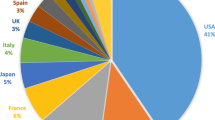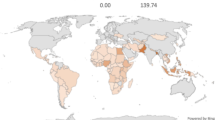Abstract
We study determinants of COVID-19 vaccine donations from recipients’ perspective, especially considering supply chain and institutional weakness (corruption) aspects. Results, based on data from more than 130 nations, show that strengthened supply chains reduced donations. The impacts of corruption and logistics performance likely persisted from pre-COVID times. More corrupt nations received fewer donations per capita, ceteris paribus. The results with respect to economic prosperity support efforts to end vaccine apartheid, and island nations received more donations, as did nations with more bilateral vaccine deals. Finally, donations received through COVAX were driven by qualitatively similar factors, except corruption did not matter.
Similar content being viewed by others
Data availability
The data that support the findings of this study are available from the corresponding author upon reasonable request.
Notes
Some of the vaccine disparities might be due to vaccine hesitancy across certain population groups (Goel et al. (2023)).
COVAX stands for COVID-19 Vaccines Global Access.
Goel et al. (2021b) examine a different effect of logistics by considering their effects on economic growth.
United Nations Office on Drugs and Crime (2021). COVID-19 vaccines and corruption risks: Preventing corruption in the manufacture, allocation and distribution of vaccines. https://www.unodc.org/documents/corruption/COVID-19/Policy_paper_on_COVID-19_vaccines_and_corruption_risks.pdf.
In some cases, the single dose Johnson & Johnson vaccines were donated – see https://www.unicef.org/cambodia/press-releases/united-states-donates-more-1-million-johnson-johnson-single-dose-vaccines-cambodias
These supply chain aspects mainly relate to transportation bottlenecks. There may be other issues like greater absenteeism that can affect supply chain aspects. Absenteeism would partly be captured in the timeliness of deliveries.
Island nations pose somewhat different supply chain issues than other nations and that is discussed below (also see Arvis et al. (2007)).
We are aware that there are many dimensions of institutional quality, and that there are other measures (e.g., government effectiveness, rule of law, etc.). We are using corruption due to its multidimensional nature and the underlying measure of corruption is comparable across nations. Plus, the main focus of this work is not on this aspect.
Given its multidimensional character, corruption can possibly impact logistics performance as well (Goel et al. (2020)). Such issues are less of a concern in a cross-sectional analysis.
Of course, this cannot fully address how well equity considerations were met in achieving equal vaccine access. A poor nation may have received a relatively large allocation of vaccines, but due to graft, political favoritism, and other considerations, the vaccines were not equitably distributed within the receiving country.
For further details on the methodology used to track vaccine supply, see https://www.imf.org/en/Topics/imf-and-covid19/-/media/Files/Topics/COVID/IMF-WHO/imf-who-covid-19-vaccine-supply-tracker-methodology.ashx.
For further details on the methodology used to construct the Index, see https://lpi.worldbank.org/sites/default/files/2023-04/Methodology_LPI_survey.pdf.
For further details, see https://lpi.worldbank.org/international/aggregated-ranking. The LPI is produced every two years.
Not surprisingly, the pairwise correlations between all four dates reflecting COVID-19-related deaths were quite high, in all cases they exceed 0.96.
For further information on the methodology used to construct the index, see https://images.transparencycdn.org/images/CPI_2022_Methodology.zip.
Not all nations received vaccine donations. In our dataset, 40 countries (out of 131 total) received zero donations during the period analyzed, and 43 countries had zero COVAX distributions. Furthermore, information on the source of donations received by each country does not seem to be publicly available. See Goel and Nelson (2021) for a study of vaccination information in the United States.
Note that the economic significance of the coefficient on the GDPpc variable should keep in mind that it is in logs (Table 1).
It could be the case that the form of the government of the vaccine donor nations might be relevant. However, given the relatively few donor nations and the opaqueness of the supply-side data, we are unable to focus on the behavior of donor nations.
Incidentally, the elasticity of DONATIONSpc with respect to INTLship from Model 2.2 (= −5.66) is almost identical to that with respect to LogisticPERF from Model 1.1 (= −5.64).
References
Afonso Ó (2023) Inter- and intracountry effects of the Covid-19 pandemic on wages and economic growth. Bull Econ Res. https://doi.org/10.1111/boer.12412. (forthcoming)
Arvis J-F Ojala L, Shepherd B, Ulybina D, Wiederer C (2023) Trade logistics in the global economy. International Bank for Reconstruction and Development/The World Bank. https://lpi.worldbank.org/international/aggregated-ranking
Arvis J-F, Ojala L, Wiederer C, Shepherd B, Raj A, Dairabayeva K et al (2018) Connecting to compete 2018: trade logistics in the global economy. The World Bank, Washington. https://openknowledge.worldbank.org/handle/10986/29971
Arvis J-F, Raballand G, Marteau J-F (2007) The cost of being landlocked: logistics costs and supply chain reliability. In: Policy Research Working Paper; No. 4258. The World Bank, Washington. https://openknowledge.worldbank.org/handle/10986/7420
Baldwin R, Weder di Mauro B (eds) (2020) Economics in the time of COVID-19. Centre for economic policy research. CEPR Press, London. http://acdc2007.free.fr/ceprcorona.pdf
Bajaj SS, Maki L, Stanford FC (2022) Vaccine apartheid: global cooperation and equity. Lancet 399(10334):1452–1453
Barceló J, Chih-Hsin Sheen G, Tung HH, Wu W-C (2022) Vaccine nationalism among the public: a cross-country experimental evidence of own-country bias towards COVID-19 vaccination. Soc Sci Med 310:115278
Barro RJ (2022) Vaccination rates and COVID outcomes across U.S. states. Econ Hum Biol 47:101201
de Bengy Puyvallée A, Storeng KT (2022) COVAX, vaccine donations and the politics of global vaccine inequity. Glob Health 18:26. https://doi.org/10.1186/s12992-022-00801-z
Deutsch J (2021) EU and AstraZeneca settle court case over vaccine supply. POLITICO, September 3. https://www.politico.eu/article/eu-and-astrazeneca-settle-court-case-over-vaccine-supply/. Accessed 27 May 2023
Dimant E, Tosato G (2018) Causes and effects of corruption: what has past decade’s empirical research taught us? A survey. J Econ Surv 32(2):335–356
Donchev D, Ujhelyi G (2014) What do corruption indices measure? Econ Polit 26(2):309–331
Dohse D, Goel RK, Saunoris JW (2023) Supply chain constraints and research spending: an international investigation. J Technol Transfer. https://doi.org/10.1007/s10961-023-10044-8. (in press)
Dragomirescu-Gaina C (2021) Facing an unfortunate trade-off: policy responses, lessons and spillovers during the COVID-19 pandemic. Econ Hum Biol 43:101052
Elekdag S, Muir D, Wu Y (2015) Trade linkages, balance sheets, and spillovers: the Germany-Central European supply chain. J Policy Model 37(2):374–387
Fernandes N (2020) Economic effects of coronavirus outbreak (COVID-19) on the world economy. Spain: IESE Business School. Preliminary version
Gibson J, Sun X (2023) A synthetic control analysis of U.S. state level COVID-19 stay-at-home orders on new jobless claims. J Econ Financ 47:1–14
Goel RK (1990) The substitutability of capital, labor, and R&D in U.S. manufacturing. Bull Econ Res 42(3):211–227
Goel RK (2009) Technological complementarities, demand, and market power. NETNOMICS 10(2):161–170
Goel RK (2020) Uncharitable acts in charity: socioeconomic drivers of charity-related fraud. Soc Sci Q 101(4):1397–1412
Goel RK, Haruna S (2021) Unmasking the demand for masks: analytics of mandating coronavirus masks. Metroeconomica 72(3):580–591
Goel RK, Jones JR (2022) Managing the risk of COVID-19 via vaccine passports: modeling economic and policy implications. Manag Decis Econ 43(6):2578–2586
Goel RK, Jones JR, Saunoris JW (2023) Explaining vaccine hesitancy: a COVID-19 study of the United States. Manag Decis Econ 44(2):1073–1087
Goel RK, Mazhar U, Saunoris JW (2020) Identifying the corrupt cog in the wheel: dimensions of supply chain logistics and cross-country corruption. Aust Econ Pap. https://doi.org/10.1111/1467-8454.12226
Goel RK, Nelson MA (2021) COVID-19 internet vaccination information and vaccine administration: evidence from the United States. J Econ Financ 45:716–734
Goel RK, Nelson MA (2023) Give me your best shot! Diffusion of complete versus booster Covid-19 vaccines across US counties. CESifo Working Paper #10559
Goel RK, Nelson MA, Goel VY (2021a) COVID-19 vaccine rollout—scale and speed carry different implications for corruption. J Policy Model 43(3):503–520
Goel RK, Saunoris JW, Goel SS (2021b) Supply chain performance and economic growth: the impact of COVID-19 disruptions. J Policy Model 43(2):298–316
Haffajee RL, Mello MM (2020) Thinking globally, acting locally—the US response to COVID-19. N Engl J Med 382:e75. https://doi.org/10.1056/NEJMp2006740
Harris E, Petrovits C, Yetman MH (2017) Why bad things happen to good organizations: the link between governance and asset diversions in public charities. J Bus Ethics 146(1):149–166
Hsiao Y, Lin F-Y, Sheen GC-H, Wang C-H (2023) Politics matters for individual attitudes toward vaccine donation: cross-national evidence from the United States and Taiwan. Glob Health 19:40. https://doi.org/10.1186/s12992-023-00940-x
Ivanov D (2020) Predicting the impacts of epidemic outbreaks on global supply chains: a simulation-based analysis on the coronavirus outbreak (COVID-19/SARS-CoV-2) case. Transp Res E-Log 136:101922
Kickbusch I (2021) Can geopolitics derail the pandemic treaty? BMJ 2021:375. https://doi.org/10.1136/bmj-2021-069129
Kumar A, Priya B, Srivastava SK (2021) Response to the COVID-19: understanding implications of government lockdown policies. J Policy Model 43(1):76–94
Luo S, Tsang KP (2020) China and world output impact of the Hubei lockdown during the Coronavirus outbreak. Contemp Econ Policy 38(4):583–592
McDonnell D, Rutherford AC (2018) The determinants of charity misconduct. Nonprofit Volunt Sect Q 47(1):107–125
Morelli P, Seghezza E (2021) Why was the ECB’S reaction to Covid-19 crisis faster than after the 2008 financial crash? J Policy Model 43(1):1–14
Nordås HK, Pinali E, Grosso MG (2006) Logistics and time as a trade barrier. In: OECD trade policy papers, No. 35. OECD Publishing, Paris. https://doi.org/10.1787/664220308873
Ranney ML, Griffeth V, Jha AK (2020) Critical supply shortages — the need for ventilators and personal protective equipment during the Covid-19 pandemic. N Engl J Med 382:e41. https://doi.org/10.1056/NEJMp2006141
Reiter O, Stehrer R (2023) Assessing the importance of risky products in international trade and global value chains. Empirica 50:7–33
Rowan NJ, Laffey JG (2020) Challenges and solutions for addressing critical shortage of supply chain for personal and protective equipment (PPE) arising from Coronavirus disease (COVID19) pandemic – case study from the Republic of Ireland. Sci Total Environ 725:Article 138532
Sobo EJ, Cervantes G, Ceballos DA, McDaniels-Davidson C (2022) Addressing COVID-19 vaccination equity for Hispanic/Latino communities by attending to aguantarismo: a Californian US–Mexico border perspective. Soc Sci Med 305:115096
Storeng KT, de Bengy Puyvallée A, Stein F (2021a) COVAX and the rise of the ‘super public private partnership’ for global health. Glob Public Health. https://doi.org/10.1080/17441692.2021.1987502
Storeng KT, Stein F, de Bengy Puyvallée A (2021b) COVAX and the many meanings of sharing. BMJ Glob Health 6(11). https://doi.org/10.1136/bmjgh-2021-007763
Sun S (2022) The demand for a COVID-19 vaccine. Econ Hum Biol 46:101135
York G (2021) Canada donates soon-to-expire COVID-19 vaccines to Africa as global shortage worsens. The Globe and Mail, September 9. https://www.theglobeandmail.com/world/article-canada-donates-soon-to-expire-vaccines-to-africa-as-global-shortage/. Accessed 27 May 2023
Acknowledgements
We thank two referees and the editor for useful comments. An earlier version of this paper was circulated as a CESifo working paper # 10723.
Author information
Authors and Affiliations
Corresponding author
Ethics declarations
Conflict of interest
The authors declare no conflict of interest.
Additional information
Publisher's Note
Springer Nature remains neutral with regard to jurisdictional claims in published maps and institutional affiliations.
Rights and permissions
Springer Nature or its licensor (e.g. a society or other partner) holds exclusive rights to this article under a publishing agreement with the author(s) or other rightsholder(s); author self-archiving of the accepted manuscript version of this article is solely governed by the terms of such publishing agreement and applicable law.
About this article
Cite this article
Goel, R.K., Nelson, M.A. Ending COVID-19 vaccine apartheid through vaccine donations: the influence of supply chains. J Econ Finan (2024). https://doi.org/10.1007/s12197-024-09662-1
Accepted:
Published:
DOI: https://doi.org/10.1007/s12197-024-09662-1
Keywords
- COVID-19
- Vaccine donations
- Equity
- Supply chain
- Corruption
- Logistics
- International shipments
- Pandemic
- Government
- COVAX




